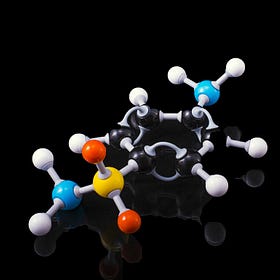The Science Behind A Ketogenic Diet
The keto diet is something that has gained much popularity over the years. What is a “low carb, high fats (LCHF)” diet supposed to do with our bodies, however?
It’s not easy for us to steer away from carbohydrate-rich processed foods. They’re our “comfort foods” - things that we may binge on when we’re stressed out. Such as ice cream, for instance:
The marketing and advertising just will not let up.
Some people, of course, have figured out that going on a ketogenic, or “keto” diet is great for them because it’s essentially a diet that is low on carbohydrates. Eat less carbohydrates, get less inflammation, and the risk of developing Type 2 diabetes or heart disease can be greatly reduced - all these issues are symptoms of overconsuming carbohydrates.
But of course, there will be others who just want to make money advertising and marketing a fad diet or a plan or a training course that doesn’t really do squat.
So rather than throwing money away on stuff that doesn’t work, let’s look at developing a better understanding of what a keto diet is all about.
Bulletproof coffee, anyone?
I’m not here to pedestalise or to demonize the keto diet. I’m here to deconstruct what it does do in the body and provide a balanced overview of the science behind it.
It is a common fact that our cells use the tricarboxylic acid cycle (TCA, also known as the citric acid cycle or the Krebs cycle) to generate energy from this molecule known as acetyl-coenzyme A (acetyl-CoA).
Acetyl-CoA is oxidised in the mitochondria to synthesise adenosine triphosphate (ATP), the biochemical energy currency that is used by the cells for energy purposes. Acetyl-CoA can be obtained from glucose (carbohydrates) or ketones (from fatty acids), which we do consume in our diets.
The body preferentially uses glucose as a source of acetyl-CoA, but when there is a scarcity of carbohydrates in the diet, the body shifts its source of energy derivation towards the ketones.
That’s the main idea behind the keto diet.
By going keto, the main aim is to shift the source of energy derivation from carbohydrates towards ketones. If one can switch that source satisfactorily well, their dependence on carbohydrate consumption can be lowered significantly.
Hence, the keto diet would generally recommend more fats and fewer carbohydrates in one’s diet.
The main metabolism switch comes from the peroxisome proliferator-activated receptor alpha (PPAR-α) transcription factor. It is said in this paper that PPAR-α “is a ligand-activated nuclear receptor highly expressed in the liver”, and that PPAR-α also regulates the expression of fatty acid-metabolising enzymes in the liver.
In this case, our liver would be a key player in switching our energy consumption from carbohydrates to ketones. Supporting PPAR-α activity is also said to improve one’s liver health, including alleviating liver issues such as:
steatosis, inflammation and fibrosis in pre-clinical models of non-alcoholic fatty liver disease.
However, as our diet is widely varied, one person’s keto may not necessarily be another person’s keto, let’s be clear on that.
It’s not easy to achieve uniformity in a keto diet, even if the types of food being consumed are similar.
For example, in the consumption of meat. We may just loosely say “eat more meat and eat less carbohydrates”, for instance. However, what would happen if I were to consume meat that is high in antibiotics because I’m not really being careful about choosing “organic”? Would that have an influence on my health, as compared to one who consumes antibiotic-free meat?
In the consumption of other products, such as fats and eggs, dioxin content can be a problem, even from organic sources.
I’m saying that there can be external influences that are not within our control, and that can never be fully within our control. The presence of these unaccounted-for contaminants can do a bigger number on our health - especially on that very liver that is responsible for flicking the switch on ketone utilization.
That goes for people on any kind of diet.
The main takeaway, though? Support the functions of the cells in our tissues and organs optimally, and they will respond in kind by functioning optimally. It doesn’t matter what kind of diet that we can use to achieve that — but definitely, we do know that a diet high in processed carbohydrates and/or fats with little else in nutrient content will NOT work.
But yet there are so many variables that aren’t within our control. We do have to know what to eat, how to eat and why we’re eating what we’re eating, especially when what we put into our bodies will have long-term consequences on our our bodies operate and function.
After all, it isn’t rocket science that if we don’t properly maintain (or “feed”) our cars with the right kinds of fuel, engine oil, or just keeping the tyres inflated to certain pressures, we wouldn’t be getting peak performances out of it, would we? Even the fuel that we feed into our cars comes in different grades, and higher quality fuel leads to smoother car operations.
The next question would also be - what would be the “collateral damage” from improper maintenance? Do we really know the severity of the implications behind excess sugar in our blood, for instance? Or is it just too much sugar in our blood?
The Humble Aldehyde Is Something That We Ought To Be Very Wary Of When Consuming Processed Foods.
It’s quite interesting to note these days what we can eat and what we shouldn’t be eating. Even if the food product is actually edible… the metabolites may not be regarded as safe.
Do feel free to check out What Nutrients Support Digestion And Detox In Our Body? to see what helps to support liver functions in our body!
What Nutrients Support Digestion And Detox In Our Body?
The digestion of any food or other substances that we ingest, as well the subsequent elimination of these products from our digestive system undergoes a relatively complex mechanism.
Also, do feel free to share this article and hit the “subscribe” button to get more updates about the science concepts in nutrition and health, all deconstructed nicely for your convenient perusal!






